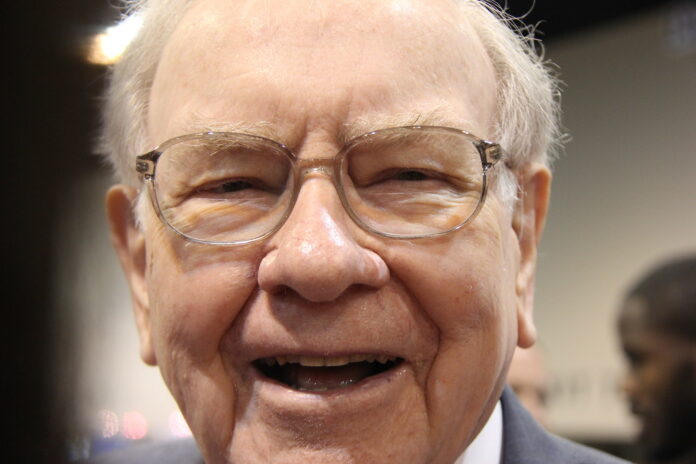Looking for dividend growth stocks? It could pay to take a couple of pages out of Buffett’s investing playbook.
Under the leadership of CEO Warren Buffett, Berkshire Hathaway has paid a dividend to its investors just once (a $0.10 per share payout back in 1967). Instead, the company chooses to use its capital to invest in its wholly owned businesses and other companies, make new acquisitions, buy Treasury bonds, and buy back its own shares.
With Berkshire’s stock up more than 3,976,400% since Buffett purchased a controlling stake in the company in 1965, it’s hard to argue with the Oracle of Omaha’s capital-allocation strategy. The stock’s gains across the stretch would have turned a $1,000 investment into more than $42.5 million today.
Even though Berkshire doesn’t pay a dividend itself, Buffett is a big fan of companies that return cash to shareholders through direct payouts. In fact, each of the company’s 10 largest stock holdings pays a dividend — and its portfolio is heavily weighted toward just a handful of dividend-paying stocks. Read on for a look at the two dividend stocks that account for 40.5% of Berkshire Hathaway’s $312 billion stock portfolio.
A lot more than the dividend
Jennifer Saibil: Apple (AAPL -0.70%) was recently inducted into Buffett’s hallowed trio of stocks he said he’d never sell. As it turns out, he meant that he’d never sell the full position because he sold some Apple stock immediately after he said it.
But that doesn’t mean it’s fallen out of Buffett’s favor. It still accounts for roughly 28.3% of the entire Berkshire Hathaway portfolio.
Like the other Buffett forever holdings, Apple is a dividend stock. It doesn’t have a high yield — just 0.45% at the current price, or well below the S&P 500 average of 1.3%. That’s close to its lowest-ever yield, which is partially because Apple stock has been outstanding this year, gaining almost 15% year to date.
The dividend demonstrates several things that are important to Buffett, regardless of the yield. It’s a tangible sign of Apple’s commitment to creating shareholder value and means management is prioritizing its cash position, which is paramount to operating a viable and growing business. Apple has a low payout ratio of only 14.9% because it’s still in a robust growth mode and uses most of its earnings for innovation and operations.
Apple has the global brand name and moat that Buffett loves, and being able to support that is a key element of sustaining its lead and edge. Apple fans are known to stick with the company’s platform, trading up for new models when they’re released. They’re loyal to the Apple ecosystem, which is differentiated through its innovation, operating system, ease of use, and general excellence. Buffett said that Apple is an even better business than his other forever stocks, Coca-Cola and American Express (AXP -3.09%).
It’s not surprising that Apple is beating the market this year or is back in the top spot as the most valuable company on the stock market. It’s exciting investors with its advancement in artificial intelligence, and the newest iteration of the iPhone is expected to be released this month. Even though it’s already minted plenty of millionaires, there’s a lot more to expect from Apple stock.
American Express is now Buffett’s second-biggest bet
Keith Noonan: Following some significant portfolio reshuffling in the second quarter, American Express overtook Bank of America to become Berkshire’s second-largest overall stock holding. The Oracle of Omaha’s company owns more than 151.6 million shares of AmEx stock, and the position accounts for 12.2% of its total stock holdings.
The credit card-focused banking company has been serving up strong financial results, and its share price has risen roughly 58% over the last year. These big gains have also pushed down the company’s dividend yield. That’s not a problem for Berkshire because the company acquired the bulk of its AmEx shares at much lower prices, but is the stock still worthwhile for other income-seeking investors at today’s prices?
While the company’s current yield of roughly 1% may not look like much, there’s a good chance that shares purchased today will boast a much bigger yield down the line. American Express has increased its dividend payout by roughly 63% over the last three years and hasn’t been letting up on the gas pedal when it comes to payout growth.
With the payout increase it announced back in March, American Express hiked its dividend by 17%. Strong financial performance has paved the way for big payout growth, and there are good reasons to expect that profit expansion will continue to facilitate rapid dividend growth.
American Express’s revenue increased 8% year over year in the second quarter, and non-GAAP (adjusted) earnings per share rose 21%, compared to the prior-year period. The company added 3.3 million new card accounts in the quarter and recorded its 24th consecutive quarter of double-digit annual growth for card fees. For the full-year period, the company expects that it will grow sales between 9% and 11%, and its midpoint guidance calls for earnings growth of roughly 21%.
The American Express brand and its financial products have continued to gain favor. And thanks to its focus on attracting a high-credit-quality customer base, the company also has the benefit of credit default rates that are best in class. While the stock’s yield comes in below the S&P 500 index’s average, it still looks like a worthwhile investment.
Bank of America is an advertising partner of The Ascent, a Motley Fool company. American Express is an advertising partner of The Ascent, a Motley Fool company. Jennifer Saibil has positions in American Express and Apple. Keith Noonan has no position in any of the stocks mentioned. The Motley Fool has positions in and recommends Apple, Bank of America, and Berkshire Hathaway. The Motley Fool has a disclosure policy.



